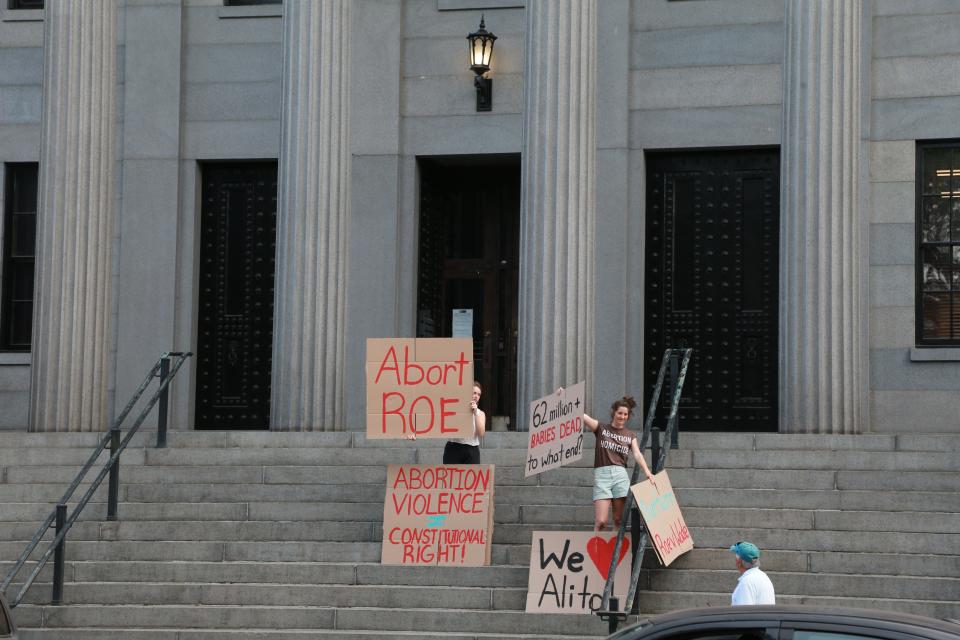Protect-lifers wanted Roe v. Wade gone. Helping mothers requires more than prayers and picketing
This commentary is written by opinion columnist Adam Van Brimmer.
The U.S. Supreme Court ruled Friday to protect the unborn, invalidating Roe v. Wade.
In states that move to restrict abortions, including our own here in Georgia, the protect-life crowd better skip the victory lap. Fetuses may be safer today, but mothers are not.

Anti-abortion lawmakers and leaders of influential faith-based organizations must take the lead in developing and implementing strategies to curb unwanted pregnancies and assist those who find themselves with child anyway.
In a post-Roe world, doing so will require more than prayers and picketing.
Abortion law changes ahead: Here's what happens in Georgia if Roe v. Wade is overturned
Abortion debate: Could Georgia copy and paste Texas' abortion bill?
Get comfortable with the uncomfortable
Protect-lifers must face some uncomfortable truths regarding sex education, adoption laws, and maternity and child care investment.
The culture wars and the political influence of evangelical Christians have poisoned these topics. Too many social conservatives see anything that doesn't fit in their own narrow moral-belief system as evil. As these personal principles seep into the political discourse, troubling trends follow.
In schools, parental rights groups are pushing to narrow sex education for teens by restricting what is taught or insisting on “opt-out” opportunities. And God forbid anyone promote contraception. If we want fewer teen pregnancies, birth control products must be accessible, affordable and not taboo.
Ban those books?: The debate over 'obscene' books in school libraries comes to Savannah

In statehouses, lawmakers advance legislation that shrinks the adoptive parent pool. Abortion law changes are sure to result in a surge of babies put up for adoption, and many states unduly bar or limit same-sex couples, single men and women, or those who don’t meet a certain financial threshold from adopting.
Neighboring South Carolina is among several states with laws that allow child placement agencies to turn away would-be parents based on religious beliefs or moral convictions. Those states would do well to follow Georgia's lead by rejecting “religious liberty” bills and enact laws that ease the state's adoption process, such as those signed in recent years by Gov. Brian Kemp, a Republican.
In the evangelical community, officials funnel money into operating “crisis pregnancy centers,” many of which function largely as anti-abortion propaganda hubs preying on scared girls and women. Those dollars would be better spent on maternity homes set up to assist low-income single women who choose to have their babies.
Another necessary investment would be in child care services. Traditional churches at the center of the anti-abortion movement need to expand their preschools and daycares and offer them at little or no cost. Public schools can open centers on their campuses for student mothers to help them continue their educations so that they have a better chance of providing for their families in the future.
Time to get real about what “pro-life” really means. We give the unborn the right to life, we next need to do everything possible to give mothers and their babies a chance at fulfilling lives.
Actions, not words, needed on women's health
Post-Roe America must see expectant mothers as more than a vessel.
Here in Georgia, our maternal mortality rate is atrocious, one of the worst in the industrialized world. The dangers of pregnancy are particularly pronounced for Black Georgians — three times the rate of white women nationwide.
Maternal mortality crisis: Georgia nonprofit focuses on improving healthy outcomes for new moms
The Georgia General Assembly is moving to address the crisis. A House special committee created in 2019 studied maternal mortality and recommended actions. Legislation extending temporary Medicaid coverage for new mothers passed this year.

At the federal level, one of Georgia’s U.S. senators, Raphael Warnock, has introduced a measure to improve maternal health outcomes.
But like so many legislative efforts, progress is slow. New and expectant mothers can’t wait. Anti-abortionists need to add their voices and influence to the push for assisting new mothers and mothers-to-be. Protect-lifers could take the initiative in partnering with pro-choice leaders to create a comprehensive infrastructure, grounded in education and support services, to address unwanted pregnancies.
After all, a majority of Americans – more than two-thirds, according to polls – were against the overturning of Roe v. Wade. With the Supreme Court ruling, many are now asking, "Now what?" Leaders better have answers.
Shortly after the Supreme Court leak in May, a Savannah-area clergyman called the pending decision an answer to a “lifetime of prayers.”
The prayer list for protect-lifers may be changing, but it’s not getting any shorter.
Contact Van Brimmer at avanbrimmer@savannahnow.com and follow him on Twitter @SavannahOpinion.
This article originally appeared on Savannah Morning News: Roe v. Wade Supreme Court abortion decision: Pro-lifers must help moms

